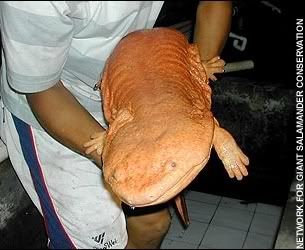 Amphibians as a rule are not cute and cuddly which puts them way down the pecking order of species that need to be saved.
Amphibians as a rule are not cute and cuddly which puts them way down the pecking order of species that need to be saved.But they are a key indicator species and if they start to decline it is a clear warning that the environment is in trouble.
The Zoological Society of London (ZSL) has drawn up a list of some of the world's most extraordinary creatures threatened with extinction.
They found 85 per cent of the top 100 of the 'world's weirdest and most endangered creatures' are receiving little conservation attention and will disappear if no action is taken.
ZSL has identified and is starting work to protect 10 of the most unusual and threatened EDGE amphibian species this year. They include:
*Chinese giant salamander (salamander that can grow up to 1.8m in length and evolved independently from all other amphibians over 100m years before Tyrannosaurus rex)
*Sagalla caecilian (limbless amphibian with sensory tentacles on the sides of its head)
*Purple frog (purple-pigmented frog that was only discovered in 2003 because it spends most of the year buried up to 4m underground)
*Ghost frogs of South Africa (one species is found only in the traditional human burial grounds of Skeleton Gorge in Table Mountain, South Africa)
*Olm (blind salamander with transparent skin that lives underground, hunts for its prey by smell and electrosensitivity and can survive without food for 10 years)
*Lungless salamanders of Mexico (highly endangered salamanders that do not have lungs but instead breathe through their skin and mouth lining)
*Malagasy rainbow frog (highly-decorated frog that inflates itself when under threat and can climb vertical rock surfaces)
*Chile Darwin's frog (a frog where fathers protect the young in their mouths, this species has not been officially seen since around 1980 and may now be extinct)
*Betic midwife toad (toads that evolved from all others over 150m years ago - the males carry the fertilised eggs wrapped around their hind legs)
*Gardiner's Seychelles frog (perhaps the world's smallest frog, with adults growing up to just 11mm in length - the size of a drawing pin)
Source: Telegraph
